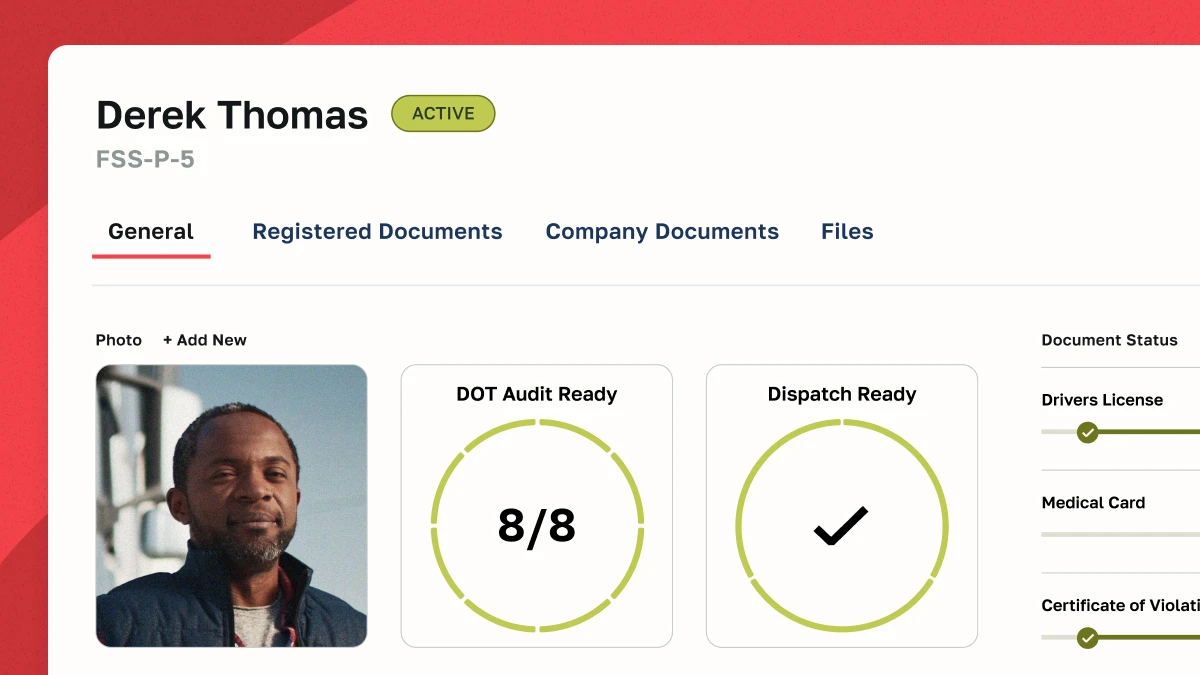Ensuring accurate management of FMCSA driver qualification files (DQF) is a major component of demonstrating your operation’s compliance to strict federal standards. Maintaining these records will ensure your files remain audit-ready and your fleet is compliant.
Similar to how telematics have revolutionized fleet management, DQF management has evolved with new technologies and regulatory updates. These advancements have streamlined compliance, enhanced driver safety, and improved operational efficiency. As the industry continues to progress, staying ahead of these changes is vital. Companies that proactively adapt to emerging trends and regulatory shifts will be best positioned for success.
Understanding FMCSA Driver Qualification Files
A DQF is a comprehensive record mandated by the Federal Motor Carrier Safety Administration (FMCSA) for each commercial motor vehicle (CMV) driver. Established under 49 CFR Part 391, a DQF verifies drivers’ compliance with federal requirements so they can operate commercial vehicles safely and legally.
Key Components of a Driver Qualification File
The key DQF components are outlined below. Maintaining these elements can help ensure compliance with FMCSA regulations and support the safe and legal operation of your commercial vehicle fleet.
Medical Certificates
A Medical Examiner’s Certificate, required under 49 CFR 391.41, verifies the driver’s physical fitness to operate a CMV. They’re expected to update it every two years, unless otherwise specified by the examiner. Conditions such as vision or hearing impairments, diabetes, and cardiovascular issues must be assessed so you can make sure the driver meets the health and safety standards required to perform their duties.
For commercial driver’s license (CDL) holders, you can obtain the CDLIS motor vehicle record (MVR) to verify the driver’s medical status. Drivers with physical impairments affecting CMV operation may need a Skill Performance Evaluation (SPE) certificate to prove the driver can safely operate CMVs despite their impairments.
Driving Records
Per 49 CFR 391.23(a)(1), every year, motor carriers must request and retain an MVR from every state for three years. Continuous assessment of the driver’s compliance with safe driving standards is the best way to keep the roads safe and your business’s reputation squeaky clean.
Carrier’s Annual Review of Record
An annual review of each driver’s MVR is mandated under 49 CFR 391.25(c)(2) to show they still meet the minimum safe driving requirements and are free of disqualifying offenses. Elements to review and record include any new violations, accidents, or suspensions.
Employment History
Required under 49 CFR 391.21, the driver’s application for employment captures detailed information about their background, qualifications, and work history relevant to operating CMVs. It should cover the past three years for non-CDL drivers, and the last ten years for CDL drivers.
Contacting previous employers is necessary to gather information on the driver’s accident history and any violations of alcohol and controlled substances regulations. Thorough documentation of these inquiries can protect you against litigation in case of a legal claim.
Best Practices for Maintaining Driver Qualification Files
Achieving consistent compliance can be challenging, but fleet managers can take proactive steps to ensure DQFs remain audit-ready. By following best practices and staying organized, the process can be streamlined and maintain high standards.
Regular Audits and Updates
Motor carriers should conduct quarterly audits to thoroughly review each DQF, including medical certificates, driving records, and employment histories. Detailed documentation of audit findings and corrective actions help you maintain regulatory compliance and uphold exacting safety standards within the fleet. Fleetworthy Solutions™ can assist with compliance consulting and audit support services.
Digital Management Systems
Digital management systems significantly streamline DQF maintenance and provide centralized and automated solutions to help you keep documents consistently up-to-date. For example, with a DMS, you get automated alerts. They inform fleet managers of expiring documents and upcoming renewals, helping you avoid lapses in compliance and reducing the risk of penalties.
Employee Training and Awareness
An informed team is better equipped to manage and update records correctly. Training should cover critical areas such as driver qualification requirements, hours-of-service (HOS) regulations, and vehicle maintenance standards. Utilizing resources like the FMCSA’s Safety Planner can help structure these sessions effectively.
Consequences of Noncompliance
The consequences of neglecting to properly manage DQFs can include legal, financial, and operational repercussions. These penalties can include the following.
Legal and Financial Penalties
Noncompliance with FMCSA regulations can lead to severe financial penalties and legal actions. While specific amounts vary, the overall impact is substantial. For example, companies can face fines up to $10,000 for not maintaining complete and accurate records.
If an accident occurs involving a driver with a noncompliant DQF, the legal ramifications can be significant. Lawsuits from injured parties can target your company and allege negligence in driver qualification. If you’re implicated in a lawsuit like this, well-maintained DQFs can serve as strong evidence in your defense.
Impact on Safety and Operations
Noncompliance poses significant safety risks and operational disruptions that have a knock-on effect on your fleet’s profitability and reputation.
Increased Risk of Accidents
Incomplete or outdated driver qualification files mean that unqualified or medically unfit drivers may be operating CMVs, leading to a higher risk of accidents. This endangers lives and increases the likelihood of higher insurance premiums, reputational damage, and potential lawsuits.
Noncompliance with Hours of Service (HOS) Regulations
Noncompliance with HOS regulations, such as failing to accurately log driving hours, can lead to driver fatigue – one of the primary causes of CMV accidents. Regularly reviewing ELDs and paper RODs helps prevent fatigue-related incidents and enhances overall road safety.
High CSA Score
Noncompliance with FMCSA regulations can severely damage a company’s Compliance, Safety, Accountability (CSA) score. High CSA scores result from various violations, including failing to maintain accurate DQFs.
A high CSA score triggers increased scrutiny from the FMCSA, leading to more frequent inspections and audits, which disrupt operations and result in escalating fines and penalties. Additionally, companies with high CSA scores may face higher insurance premiums, as insurers view them as higher risk, directly impacting the bottom line.
Out-of-Service Orders
Noncompliance can lead to out-of-service (OOS) orders, grinding your fleet’s operations to a halt until all issues are rectified. Beyond operational chaos, downtime can tarnish your reputation and make it difficult to attract and retain business. Financially, OOS orders cause lost revenue, costs to address compliance issues, and potential penalties from clients due to interrupted service.
Protect Your Fleet
Conduct regular audits, leverage digital management systems, and invest in comprehensive training programs so your DQFs remain accurate and up-to-date. At Fleetworthy, we understand the time and effort this takes, and have the tools and expertise necessary to take the stress of compliance off your hands.
Learn how Fleetworthy’s fleet management solutions can bolster your fleet’s compliance firsthand by requesting a demo.




